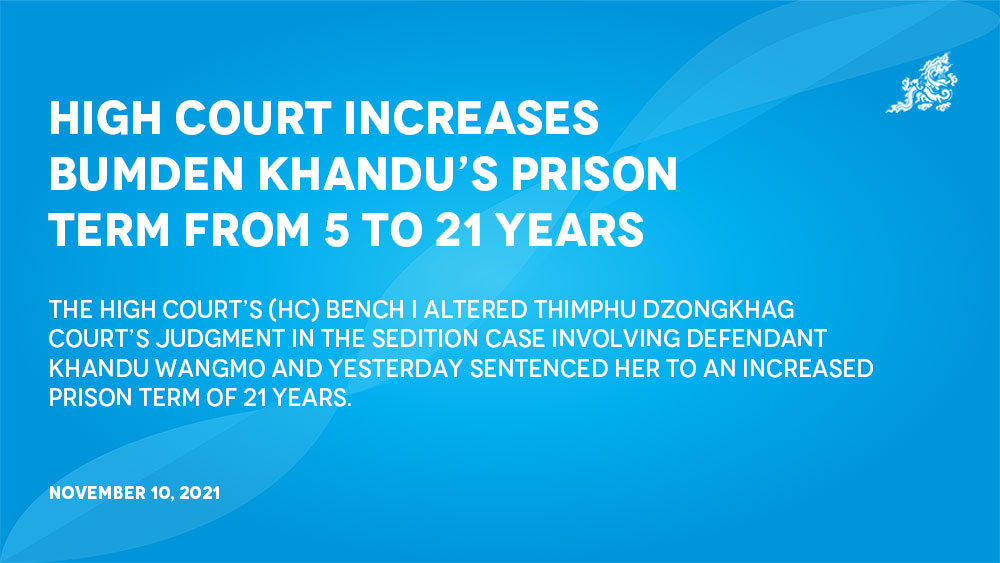Nima Wangdi
The High Court’s (HC) bench I altered Thimphu dzongkhag court’s judgment in the sedition case involving defendant Khandu Wangmo and yesterday sentenced her to an increased prison term of 21 years.
The 21-year prison term is for the three counts of sedition.
Defendant Khandu Wangmo will serve the sentence after completing her nine-year prison term for criminal conspiracy.
On September 1 this year, Thimphu dzongkhag court’s criminal bench sentenced her to 15 years in prison, five years for each count of sedition charges. However, the court reduced it to a concurrent prison term of five years.
Office of the Attorney General (OAG) appealed to the HC, requesting for a harsher punishment stating that the sentencing should have been at least 15 to 27 years.
The OAG, in a press release issued for the appeal then stated that the wide discretion exercised by the trial court with the award of five years sentence, which could have been a maximum of 27 years, dishonoured the Tsawa-Sum and disrepute the efforts of the investigation and prosecuting agencies.
“A meager sentencing of such heinous crimes could establish a wrong precedent and pose a grave concern to our security, sovereignty and constitutional sacrosanctity of our established institutions,” it stated.
Meanwhile, Khandu Wangmo was found guilty of distributing three seditious letters, which she wrote to implicate her former husband drangpon Yeshey Dorji and his family so that she need not pay the Nu 8 million loan she took mortgaging his properties.
The content of the seditious letters was mostly about people of Kheng disgruntled against the Tsawa-Sum.
According to the judgment by the trial court, Khandu Wangmo had made an official of Bhutan Narcotic Control Agency (BNCA) place the seditious letter under the table of drangpon Yeshey Dorji’s sister who works there, police constables to place the letter in drangpon Yeshey Dorji’s house in Changjiji to youth in town and also in a car belonging to Yeshey Dorji’s former brother-in-law in Babesa.
It stated that Khandu Wangmo also sought the help of an ophthalmologist to distribute the letters.
Khandu Wangmo had promised job opportunities, scholarships abroad, and military training in India to those who had helped her distribute the seditious letters.
Khandu Wangmo was convicted as per section 331 (e) of the Penal Code of Bhutan, which states that a defendant shall be guilty of the offence of sedition if the defendant issues a scurrilous and malignant statement against His Majesty or the Royal Government with the intent to defame, disrupt, encourage contempt, or incite hatred of the people against Bhutan.”
In the court trial, Khandu Wangmo had claimed innocence and blamed all the individuals involved in distributing the seditious letter and framing her. However, the court ruled that she could not substantiate her claims and all the evidence showed she was responsible for writing the seditious letters and distributing it.
She also contended before the court that all the individuals involved in the case should be implicated for sedition but the court ruled that while some people did not know the content of the letter they were distributing, others who knew did it on the behest of Khandu Wangmo that it is for national interest and that they did not have seditious intent.


